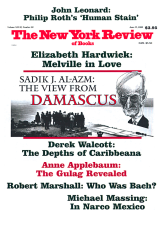To the Editors:
I would like to take exception to Conor Cruise O’Brien’s characterizations of American academic historiography as contributing to a “sentimentalized and idealized version of American history” [NYR, December 16, 1999]. He believes that what the historians featured in The Oxford History of the British Empire reveal about how colonial settlers treated Indians and blacks will “shock some of their readers,” accustomed as they allegedly are to a historiography in which “the darker side of history tends to be phased out.” Those who have read only popular history or the works of Dumas Malone (the only academic historian O’Brien mentions) may indeed be shocked, but no contemporary undergraduate history major, graduate student, or serious reader of early American history is likely to be at all shocked or surprised. For more than thirty years American historians have thoroughly explored “the darker side” of race relations in colonial America. Is Mr. O’Brien familiar with the work of Winthrop Jordan, David Brion Davis, Edmund Morgan, Gary Nash, James Axtell, Ira Berlin, Philip Morgan, and James Merrell, to take a few examples among many? One of the great achievements of the American historical profession in recent years has been the very candid and unsentimental way that it has dealt with the cruelties and injustices perpetrated by British settlers on Indians and blacks before the revolution took us out of the purview of historians of the British Empire.
George M. Fredrickson
Professor of United States History
Stanford University, and Past President of the Organization of American Historians
Conor Cruise O’Brien replies:
Professor George M. Fredrickson will no doubt be surprised to learn that I am completely in agreement with his opinion that “one of the great achievements of the American historical profession in recent years has been the very candid and concentrated way that it has dealt with the cruelties and injustices perpetrated by British settlers on Indians and blacks….”
I devoted an entire chapter—Chapter Seven of my book The Long Affair: Thomas Jefferson and the French Revolution 1785-1800 (Random House, 1998)—to the work of a number of such American historians and gave their objective work the full praise it merits.
Unfortunately—as I can now see—I failed to refer to this body of work in my recent review. What Ihad in mind when I wrote that was what I thought of as the whitewashing approach prevailing in more popular writings on historical subjects and circulating mainly among younger readers. I am grateful to Professor Fredrickson for giving me this opportunity to correct that misleading emphasis by reference to the scholarly work.
This Issue
June 15, 2000



